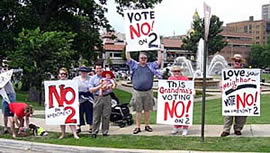A few weeks back I went to my regular polling place–the Catholic Church associated with the Archbishop’s offices next door to our home– to cast my vote in the Missouri primary. On my way I passed the Catholic run retirement community across the street, as well as the Seminary that forms the land around our housing complex.
When I got there, I was asked which ballot I wanted among the options of Democrat, Republican, Libertarian, and so on. Most of the parties had full ballot books, but the Democratic one looked like it was down to the last few pages. The state predicted there would be a heavier than normal Democratic turnout this year, as there was a battle among the Dems for both state and national positions. The Republican candidates ran uncontested for the most part.
On the ballot were two main initiatives: one in support of increased river boat gambling, and the other, a marriage amendment that would alter the state’s constitution to say that marriage was only between a man and a woman. I voted “No” on both, taking extra care to make sure I punched the right hole on the Marriage Amendment. Unfortunately, my caution was for nothing as the amendment won, and by a considerable margin.
The anti-marriage amendment forces fought to put the Marriage Amendment on the primary ballot instead of the regular ballot in November thinking there would be more Democrats voting in this primary than Republicans; more Democrats, to them, translated into more ‘no’ votes against the marriage amendment . That’s all well and fine – but what I couldn’t figure out is why those against the amendment assumed that most Democrats would vote against the marriage amendment, while most Republicans would vote for it. After all, Democrats aren’t traditionally the forerunners when it comes to social change.
Much of the early support for the Democratic party, in fact, came from southern slave holders, back before the civil war. It was this that led to the formation of the Republican Party: a group of people opposed to slavery got together in Wisconsin to create a party specifically to fight expansion of slavery*.
Remember George Wallace standing on the steps the schoolhouse in defiance of the courts, trying to bar blacks from entering a segregated school? Well old Governor Wallace was Democrat. In fact he was from that part of the southern Democrats that Howard Dean was referring to when he talked about attracting the confederate flag flying southerners–a statement that lost him most of whatever respect he had in this state.
It was the 1964 election between Johnson and Barry Goldwater that signaled a change in both the Democratic and Republican parties when it came to social issues. Many of the Southern Democrats, previously united with their northern brothers through FDR’s New Deal policies, became angry at Johnson’s overt support of the Civil Rights Movement, and made a mass exodus to the Republican Party.
There has, historically, been strong ties between slaveholding and southern fundamentalist Christian faith, with many slaveholders using religion as a defense of their actions. When those who supported segregation between blacks and whites made the move to the Republican party, they also took along much of the southern faithful with them.
This didn’t mean there was a mass exodus of people of all faith to the Republican side. For instance, members of several Protestant groups, in addition to the Jewish and the Catholic faiths have been some of the more liberal elements of the Democratic party, and have long fought for equal rights for blacks and other minorities. Rather than run from the Democratic party when it embraced civil rights, they were right there in the forefront, cheering the move on.
All well and good. Why, then, did the marriage amendment have such a success if the primary vote was mainly Democrat? since this state voted for Johnson over Goldwater, as well as Kennedy, Clinton, and other very liberal Democrats, it was a given there would be enough Democrats to help defeat the marriage amendment–or at least help contain and minimize the margin of victory.
The challenge is that even among the Democratic faithful, the fight for minority rights for blacks and adherence to other liberal causes doesn’t necessarily translate into support for some of so-called ‘personal morality issues’ –such as the support for choice, and gay rights.

It was Archbishop Burke in St. Louis – yes, the man who has offices right next door to where I live – who originally came out with the statement about denying communion to John Kerry because of Kerry’s support for Choice. And it is the same Archbishop Burke referenced in the following:
Archbishop Raymond Burke has become the effective spokesman for the orthodox Catholic position among the US bishops with his unabashed criticism of Catholic politicians who support abortion. Burke has been equally forthright on the subject of homosexual ‘marriage.’ He has issued a letter addressed to the Catholics of the St. Louis Archdiocese in which he urges his flock to participate in the decision and offers a document for instruction. Burke says, “The action in question has profound implications for the future of marriage and family life… I urge you to exercise your right and fulfill your duty to vote on Aug. 3″
Within the Republicans, on the other hand, are people who joined this party because of economic policies or issues of gun control or, most recently, the war on terror and within Iraq. Though they may be members of a particular faith, they’re not necessarily supportive of conservative religious doctrine. In fact, many Republicans are indifferent to gay rights as an issue, at worst; even supportive of gay rights, at best–when they’re gently reminded of the proud legacy of social justice that forms the history of the party.
Rather than support these initiatives, many of these Economic Right Republicans (I’ll call them for want of a better term) believe that the government has no business getting involved in people’s personal lives. Whether a woman has an abortion or not is up to the woman and her doctor. If two men who are gay want to live together, well, that’s they’re business.
The only time they’re likely to take note of these issues is when they might be impacted by them, such as having to pay taxes for welfare. Or having to fuss around with the expense of adding another amendment to a constitution.
But these people weren’t targeted here in Missouri. No, most of the effort to reach out to voters here was focused at the Democrat’s traditional base; the same base that was almost guaranteed to support the marriage amendment here in Missouri.
While the church members in support of the amendment were on the phone – I myself received three phone calls in the week before the election, and I don’t even belong to a church – those against the amendment were airing ads on TV, talking about discrimination and rights of all people, and calling the amendment “meanspirited”. But, says the kind, gray haired, sweater wearing grandma on the phone, this isn’t discrimination–all God’s children are welcome in his eyes. This is just keeping marriage to its traditional definition of being between a man and a woman.
“No one is discriminating against homosexuals in this state,” Grandma says. Heaven forbid.
Where was the kindly, gray haired sweater wearing grandma on the side of the gays?

Oh. There she is.
Those who fought the amendment continue the fight in other states, saying:
“We’re already reaching out to these other states, sharing with them what we learned, what worked, what didn’t work, and we’ll move on,” said Doug Gray, campaign manager for the Constitution Defense League. “Ultimately we’re right and they’re simply wrong.”
Ultimately we’re right and they’re simply wrong.
Doesn’t sound like proponents for gay rights learned all that much from Missouri.
*The Republicans weren’t just socially liberal when it comes to blacks, either: the first women elected to Congress in the United States was a Republican – Jeanette Rankin elected in Montana four years before women were given the right to vote in 1920.
